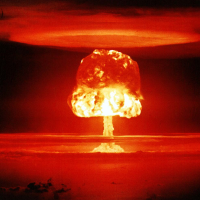Pentagon Study Criticizes U.S. Inability to Detect Foreign Nuclear Weapon Development

The U.S. government’s obsession with spying overseas to counter terrorism threats hasn’t made the country any safer when it comes to foreign powers developing nuclear weapons, a group of defense experts say.
The Defense Science Board (DSB), which advises the Pentagon, says in a new report (pdf) that American intelligence operations are not keeping up with nuclear proliferation development, a top priority for U.S. security.
But the National Security Agency (NSA) and other members of the Intelligence Community are not currently in a position to sufficiently monitor the many countries trying to build their own nuclear arsenal, the report states. U.S. detection abilities for this purpose are “either inadequate, or more often, do not exist,” wrote the report’s authors.
“The advances in persistent surveillance, automated tracking, rapid analyses of large and multi-source data sets, and open source analyses to support conventional warfighting and counterterrorism have not yet been exploited by the nuclear monitoring community…. New intelligence, surveillance, and reconnaissance (ISR) technologies, demonstrated in recent conflicts, offer significant promise for monitoring undesirable nuclear activity throughout the free world,” the DSB said.
The board noted that the NSA has clearly demonstrated it can collect “big data” when it comes to sniffing out would-be terrorism dangers, demonstrating that the agency could direct these technological capabilities towards counterproliferation. This includes monitoring the emails, web searches and conversations of scientists and engineers. Such an approach would be far more efficient than reliance on satellite photos, which the study said would be of limited use, even though there are 200 satellites engaged in “earth observation.”
The report concluded that potential new nuclear states are “emerging in numbers not seen since the early days of the Cold War,” and that “monitoring for proliferation should be a top national security objective—but one for which the nation is not yet organized or fully equipped to address.”
-Noel Brinkerhoff
To Learn More:
Defense Science Board Urges Expanded Global Monitoring (by Steven Aftergood, Secrecy News)
Pentagon Study Finds Agencies Ill Equipped to Detect Foreign Nuclear Efforts (by David Sanger and William Broad, New York Times)
Assessment of Nuclear Monitoring and Verification Technologies (Defenses Science Board) (pdf)
Nations Defy Nuclear Treaty by Expanding Weapons Programs (by Noel Brinkerhoff, AllGov)
- Top Stories
- Unusual News
- Where is the Money Going?
- Controversies
- U.S. and the World
- Appointments and Resignations
- Latest News
- Musk and Trump Fire Members of Congress
- Trump Calls for Violent Street Demonstrations Against Himself
- Trump Changes Name of Republican Party
- The 2024 Election By the Numbers
- Bashar al-Assad—The Fall of a Rabid AntiSemite






Comments